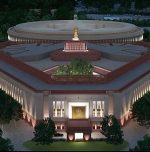Historic Women’s Reservation Bill clears hurdles in Parliament

In a historic move, the Women’s Reservation Bill has achieved a significant milestone by passing through the Upper House, marking the end of decades-long hurdles.
The bill now awaits the President’s signature to officially grant 33 per cent reservation for women in both the Lok Sabha and state assemblies.
The Rajya Sabha unanimously supported the bill, with no abstentions or opposing votes.
A total of 215 Rajya Sabha MPs voted in favour, while none opposed it. The Lok Sabha had already approved the bill the previous day, garnering support from 454 MPs, with only two voting against it.
Prime Minister Narendra Modi, who was present during the voting in the Upper House, expressed his satisfaction with the debates and thanked everyone for their support.
He emphasized that this historic decision would instil newfound self-esteem among Indians.
The Special Session of Parliament has concluded. It’s worth noting that this session marked the shift to the new Parliament building.
The Women’s Reservation Bill, once implemented, will reshape India’s electoral landscape.
The forthcoming census and delimitation process, preceding the implementation, are expected to increase Lok Sabha seats from 543 to an impressive 753.
However, the actual implementation of the 33 per cent quota will be delayed by at least six years due to the necessity for a census and delimitation exercise.
This delay has become a point of contention for the Opposition.
According to reports, the Women’s Reservation Bill, 2023, cannot be immediately put into action because a fresh census and delimitation exercise are required to avoid legal challenges.
Union Home Minister Amit Shah clarified that seat reservations for women should be determined through delimitation criteria to prevent accusations of bias.
It’s worth noting that the last available census data is from 2011, with the last delimitation exercise completed even before that.
The 2021 census was delayed due to the Covid-19 pandemic.
This marks the seventh attempt since 1996 to pass the Women’s Reservation Bill.
Despite women constituting nearly half of India’s 95 crore registered voters, their representation in Parliament is currently at only 15 per cent, with state assemblies at just 10 per cent.
Importantly, the 33 per cent reservation for women will not apply to the Upper House of Parliament and state legislatures.
Image by Akshay Gupta from Pixahive (Free for commercial use / CC0 Public Domain)
Image Reference: https://pixahive.com/photo/excited-indian-girl-3/










Leave a Reply